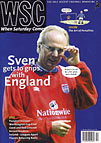 The production of footballers, like everything else in the Republic, is taking off. Dave Hannigan reports
The production of footballers, like everything else in the Republic, is taking off. Dave Hannigan reports
When the Republic of Ireland began their World Cup qualifying campaign last autumn with highly creditable draws away to Holland and Portugal, their efforts were bulwarked by the then out of favour Internazionale striker Robbie Keane, the then Everton substitute centre-half Richard Dunne and Blackburn Rovers winger Damien Duff. Despite all three battling difficult periods in their nascent club careers, they had no problems turning it on at a higher level. From three veterans of international youth football, the Irish fans would have expected nothing less.
Exactly four years have passed since the FAI asked Brian Kerr, a laboratory technician and part-time manager of St Patrick’s Athletic in the National League of Ireland, to take a leave of absence and become Ireland’s youth coach. Within six months, he guided his team to third place at the Under-20 world championship in Malaysia. The next summer, Kerr’s Under-16s became the first Irish team to win a major trophy at any level when they beat Italy in the final of the European championship. Two months after that triumph, his Under-18s edged out Germany in a penalty shoot-out at the end of a thrilling final in Cyprus. Never mind the trophies, look at the teams they beat.
The reasons behind Ireland’s successes are manifold but it has helped that more children than ever are playing soccer. The increased numbers are particularly significant in rural areas where Gaelic games have traditionally held sway. In Kerry, the county with the richest Gaelic football heritage and the present All-Ireland champions, the number of registered soccer players increased by 2,000 per cent in the ten years up to 1998. The rise in popularity is largely due to the evangelical work being done to promote the game by Sky Sports and the inevitable knock-on effect of Ireland reaching two successive World Cups in 1990 and 1994.
The extraordinary growth would probably have counted for nothing at representative level but for the unique contribution of Kerr and his assistant Noel O’Reilly. The pair served their coaching apprenticeships under Liam Tuohy, Ireland’s youth boss in the early Eighties. Despite unprecedented success in terms of reaching major championships, they were lost to the international scene for over a decade after Jack Charlton undermined Tuohy’s authority to such an extent in early 1986 that all three resigned. That the attractive football Irish youth teams play now is so utterly removed from Charlton’s brand of pragmatism is no coincidence. It is a style that flourishes despite, rather than because of, the facilities available to young Irish players.
“When we’re playing trial matches up in the AUL (Athletic Union League) complex in the muck,” says Kerr, “I’d be looking at the pitch and Noel would say: ‘This gives us a chance when we’ll be playing France and Portugal. Their blokes won’t be used to this, the wind and the rain.’ And he’s right. You can be sure that in a lot of countries, the boys would be going out on lovely manicured pitches and playing in schools of excellence from the age of 13, whereas our fellas would be playing on the side of a hill with long grass and dirt, where they have to muck in.”
Before Kerr took over, youth coaches had largely restricted their squad selections to Irish youngsters billeted at English clubs. Kerr has operated a more open-minded policy towards domestic football, believing that good players can be overlooked by the English scouts who are now swarming all over the country in search of the next Roy or Robbie Keane. While this has helped morale in the domestic game, international success has had little impact on the National League, a competition that continues to struggle.
In endeavouring to turn Ireland into a genuine power in youth football, Kerr has run foul of several English clubs who resent his desire to take every eligible Irish player to major tournaments. While David O’Leary and a lot of other myopic managers believe youngsters that have broken into their club’s first teams should forget about representing their country at youth (or any other) level, Kerr adopts a more enlightened attitude.
Like Argentina and Brazil he wants to bring his best squad to every competition because he believes the experience of playing against different styles in tournament football will benefit the players in the long term. After the way some of Kerr’s proteges played against Holland and Portugal, it’s hard to disagree.
From WSC 170 April 2001. What was happening this month